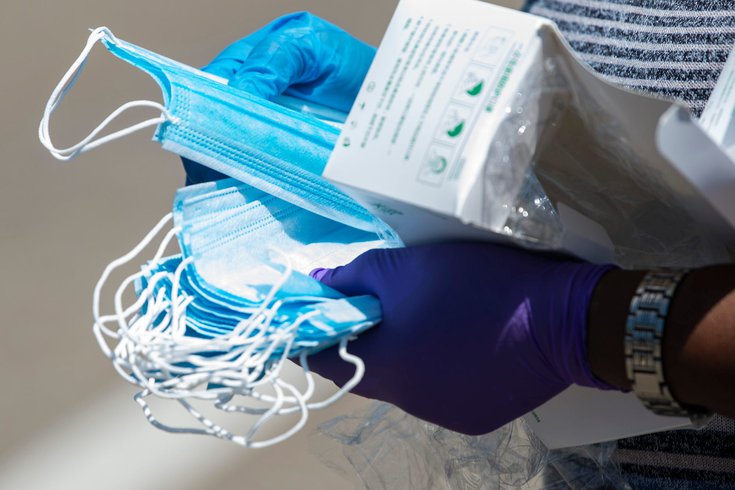
March 19, 2021
 © Jake Crandall/Advertiser via Imagn Content Services, LLC
© Jake Crandall/Advertiser via Imagn Content Services, LLC
A University of Pennsylvania professor's study of the Lawrenceville School, which was published by the CDC, shows safety measures taken by the private New Jersey boarding school worked to control the spread of COVID-19 among students and staff.
A study that monitored safety measures at a private New Jersey boarding school offers hope that in-person learning can be conducted without spreading COVID-19, if schools institute comprehensive plans – ones that include consequences for those who don't follow the rules.
Researchers tested students, faculty and staff at The Lawrenceville School twice a week after implementing strict COVID mitigation efforts and found the spread of COVID-19 among students and staff, living both on and off campus was reduced. The results were published in the Morbidity and Mortality Weekly Report of the U.S. Centers for Disease Control and Prevention.
New @CDCMMWR finds a NJ school with students living both on and off campus reduced #COVID19 spread on campus using strategies like frequent testing, contact tracing, mask wearing, & requiring students, staff & faculty to stay 6 feet apart. https://t.co/WOAq11oSWe @kevin_volpp
— UPenn Medical Ethics & Health Policy (@PennMEHP) March 18, 2021
Kevin Volpp, a professor at the University of Pennsylvania's Perelman School of Medicine and Wharton School, co-authored the study and said its findings could help schools and colleges across the country as they begin bringing students back to campus.
The study ran from August to November last year — a period when most public schools closed their buildings and worked remotely to curb the spread of COVID-19.
"This study shows that it is possible for in-person learning to be conducted without significant transmission of SARS-CoV-2, the virus that causes COVID-19," Volpp said in an email to PhillyVoice.
Of 27 #Covid cases at @LvilleSchool this fall only 2 may have originated on campus; of 31 quarantined 0 tested positive; comprehensive strategy of distancing, masking, frequent surveillance testing effective in supporting in person learning https://t.co/rcr7U8B3TO
— Kevin Volpp (@kevin_volpp) March 18, 2021
The Lawrenceville School has 520 full-time resident students and 255 commuter students in grades 9-12 and 405 faculty and staff members. Of the 19 COVID-19 cases reported among faculty and staff and eight cases among students, "Only two identified cases were plausibly caused by secondary transmission on campus," the study says.
Of the 31 individuals who were quarantined after exposure to someone with COVID-19, zero tested positive. This suggests that the schools comprehensive approach to coronavirus safety measures was effective in preventing transmission within the school.
To keep students accountable, administrators enforced disciplinary actions for violating the safety protocol.
All students and staff were required to follow a "Best for All" agreement which included mask wearing, social distancing and other policies. If students failed to comply, they would receive a strike. After three strikes, a student was sent home and not allowed to attend in-person school for two weeks.
Over the course of the fall semester, 10 of the school's 775 students were sent home for receiving three strikes.
Students and staff also were required to wear bluetooth-enabled personal devices called Peace of Mind tracers at all times except while showering or in their rooms. The device tracked who each person spent time with and for how long in order to identify students needed to quarantine in the event of community spread of the coronavirus.
Writers of the study acknowledged that while face masks, social distancing and frequent hand washing are low-cost safety measures, the twice-weekly testing and Peace of Mind devices are not as cost-effective.
"While twice weekly surveillance testing is expensive and may not be feasible for all schools,' Volpp said. "the data on lack of positive tests among close contacts who were required to quarantine indicates that the combination of universal masking, physical distancing, and a behavioral compact all students were required to follow was effective in eliminating student-to-student spread."
The CDC released safety recommendations for schools last month that encourages similar efforts outlined in Volpp's study – like universal mask-wearing, hand washing and social distancing. The Lawrenceville School study showed the effectiveness of those recommendations in action.
"It is possible using a comprehensive strategy to conduct in-person learning without significant transmission of SARS-COV-2 within a school setting," Volpp said.
Follow Hannah & PhillyVoice on Twitter: @hannah_kanik | @thePhillyVoice
Like us on Facebook: PhillyVoice
Add Hannah's RSS feed to your feed reader
Have a news tip? Let us know.